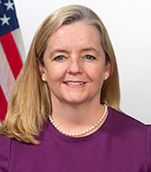
Emergency acquisitions group at center of GSA’s coronavirus response
Julie Dunne, the commissioner of the Federal Acquisition Service at GSA, in her first interview since becoming commissioner said a group of more experienced and...
Best listening experience is on Chrome, Firefox or Safari. Subscribe to Federal Drive’s daily audio interviews on Apple Podcasts or PodcastOne.
For the General Services Administration, the surge in contracting to respond to the coronavirus pandemic and now the fourth stimulus bill is business as usual.
Even with the activation of its emergency acquisitions group and new authorities, the Federal Acquisition Service is striking the balance between helping the Department of Health and Human Services, FEMA and other agencies, and pushing forward with key modernization initiatives.
Julie Dunne, the commissioner of the Federal Acquisition Service at GSA, said that contracting officers and other acquisition employees are meeting all the demands coming from multiple directions.

“I’ve heard from customers and other folks that GSA has not missed a beat in responding to the COVID-19 crisis. A lot of that is due to our telework capability and, in large part, the GSA IT shop has just been phenomenal,” Dunne said in an exclusive interview with Federal News Network. “Things we are seeing a lot of demand for, you won’t be surprised to hear, medical equipment, hand sanitizer and masks. We also are doing a lot in the IT world in terms of trying to support other agencies with telework capacity.”
Dunne said one recent example of the demand GSA is facing was when the Small Business Administration placed an order for 3,000 laptop computers so employees could telework and process on loans and similar mission support services. FAS contacting officers filled that order in half the time it usually takes.
“That was due to be the team stepping up and being agile about how they procured these things,” she said.
The SBA example and this idea of being agile when buying products and services for the pandemic is a trend among many acquisition shops.
NASA’s governmentwide acquisition contract called SEWP has implemented a one-day turnaround process for specific coronavirus related orders.
Central focus for acquisitions
Dunne said GSA activated its emergency acquisitions group to bring more agility and speed to its efforts.
The group is made up of experts from across the federal supply schedules and other parts of FAS to meet the demands of agencies more directly and centrally.
“They are familiar with the emergency planning process. They have the relationships with FEMA and developed more relationships with HHS through the public health emergency. We also pull in other contracting officers to help. Some of it is regular acquisition, but more expedited in some ways,” Dunne said. “We are pulling in some of the more experienced folks and they are able to help out with some of these buys. We have other folks throughout the organization who manage those product areas like the sanitizer and cleaning so they know that market. They are able to step in and help vet the vendors and make those lists available for customer agencies so they know where to go.”
Dunne said by bringing together experts in each of the critical product areas like cleaning supplies or technology, GSA can make it easier and ensure the process is as agile as possible for agency customers.
“One of the things we’ve learned is finding some of these cleaning supplies that are Trade Agreements Act (TAA) compliant right now is difficult. So part of what we’ve done is the market research and came up with the factual basis to say for a temporary period we will put a TAA waiver in place so we can broaden the supply base and try to find some of these cleaning supplies,” she said. “We recently put that temporary waiver in place.”
The TAA waiver is one of several memos GSA’s senior procurement executive Jeff Koses issued over the last month or so. Others include expedited payments for small contractors, raising the simplified and micro purchase thresholds and, most recently, guidance for onboarding and off boarding industry employees.
Impact on FAS sales is unclear
Dunne said another example of GSA’s agility came in early April when the Navy’s hospital ships, the U.S.S. Comfort and the U.S.S. Mercy, needed supplies. She said FAS delivered the products in record time.
“Our folks have really stepped up and recognized the need from our customer agencies. I think we understand the urgency and are trying to support DoD and other agencies who are on the frontline. We are doing a pretty good job on time to award,” she said. “We are seeing vendors really step up. We are keeping an eye on some of the supply chain issues. We are talking to our vendors and asking what do they have and how can we be helpful.”
Read more Contracting news
Dunne said thanks to the multiple award consolidation effort, FAS moved quickly to get a 3D printer vendor, who could make face shields, masks and hands-free door opening aid on the schedule for agencies to have the opportunity to purchase.
Dunne said she isn’t concerned, yet, about how the coronavirus pandemic will impact FAS’s operating model. She said while some areas like travel may see smaller sales, other areas like enhanced screening services will see huge increases.
GSA recently issued a request for information for these screening services and received 60 responses.
“GSA put up an ordering guide that has templates and it was something no one thought about in January. Now we are talking about taking temperatures and masks and the like,” she said. “Because we had such a great year in 2019, it gives us a solid basis for whatever will come in 2020. There will definitely be an impact, but we will see what happens.”
Copyright © 2024 Federal News Network. All rights reserved. This website is not intended for users located within the European Economic Area.
Jason Miller is executive editor of Federal News Network and directs news coverage on the people, policy and programs of the federal government.
Follow @jmillerWFED
Related Stories

NASA’s SEWP contract experiencing a surge in use during pandemic





